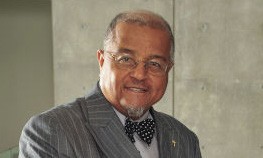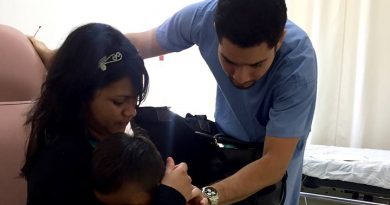A Discussion on Race and Inequality with Rev. Dr. Forrest Pritchett
Jarrett Dang
Editor-in-Chief
Just over 60 years ago, four Black students sat at a whites-only lunch counter in Greensboro, North Carolina, and sparked a national sit-in campaign against racial discrimination. The event, which we now know as the Greensboro sit-in, was a pivotal moment in the budding Civil Rights Movement spearheaded by Dr. Martin Luther King Jr. It was also where Rev. Forrest Pritchett, Ph.D., a veteran professor and activist at Seton Hall, first embarked on his lifelong commitment to fighting racial injustice in America. I got to sit down with Rev. Pritchett and ask him his thoughts on numerous topics, ranging from the parallels between the Civil Rights Era and today to how students can get more involved in the struggle against systemic racism.
Rev. Pritchett grew up in a post-WWII America mired in racial strife. He recalls numerous now-famous events while he was growing up, including the lynching of Emmett Till, Rosa Park’s refusal to give up her seat in Montgomery, and the beginnings of the sit-in movement in segregated public spaces. These served as a rallying call to a young Rev. Pritchett, who was a senior in high school in New Jersey about to head off to college. “I was somewhat committed in my mind that because of the Civil Rights Movement,” he recalls, “ I probably would not go to college in Jersey; I would probably elect to go to college in the South because of the Movement…I’d been thinking about it all summer and it’s like ‘If I don’t go, it’s like saying I’m giving in to the fear and I’m going to let somebody else fight that battle.’ I said that America’s been living with racist ideology for hundreds of years and I think now is the time to begin to step up and hold America accountable.” Rev. Pritchett would end up at Delaware State University, where his lifetime of activism would begin. In college, he participated in the sit-in movement, was thrown in jail, and worked with civil rights icons like John Lewis. Rev. Pritchett calls this time his ‘crucible’ and credits it with forming who he is today.
Rev. Pritchett explains that systemic racism can trace to the earliest beginnings of our country. For instance, all early colleges were built off the money of the plantation system in the 17th and 18th centuries. He says that while we do not hear much of this today, it serves as a reminder of how entwined the historical oppression of African Americans is with modern institutions. Rev. Pritchett also recounts how laws have been used to keep Black people down since the colonial period, saying, “There were thousands of laws written during the colonial period that said all kinds of evil things, like if a white person and a Negro were talking toward each other on a sidewalk; if the sidewalk was not large enough to accommodate two of them, the Negro is the one who must step into the road to allow the white person to pass. If a Negro spits on the ground, it’s against the law. If a Negro looks a white person in the eye, it’s against the law. During the colonial period, even if you were free, we know that 90 percent of the Negro population had a criminal record because of codes like that…We know that these codes and laws were written to really see to it that even the freed Negros – particularly men – would be caught up in the criminal justice system.”
The Civil Rights Movement and its modern counterpart, which revolve around these deep-rooted injustices, differ in two key ways. The one disparity lies in the method, as activists today have social media and other methods to organize demonstrations. The other key change is in the makeup of the coalition fighting against racism. In Rev. Pritchett’s words, “Back then, a lot of people were not inclined to be into the ‘justice issue’. It was something that mostly the Negro population as well as a lot of people in the clergy [fought for].” However, despite these nominal differences, he believes that we are largely still fighting over the same issues that started hundreds of years ago. Regarding today’s protests following the murder of George Floyd, Rev. Pritchett calls them “Simply the 21st-century rollout of the civil rights struggle…people around the world were touched by the fact that that officer’s knee was Mr. Floyd’s neck for eight minutes and 46 seconds. Now I don’t care what your views may be like on race relations, but I think that most people can see the immorality of that action.”
In his 41 years at Seton Hall, Rev. Pritchett has worked to raise awareness of racial issues and promote Black scholarship. He recalls having to deal with past instances of racial violence and 2018 Concerned 44 protests, which demanded changes at the University to address racial inequity. Rev. Pritchett cites these protests as evidence that there is still much work that needs to be done, both at the University level and beyond. For people wanting to be anti-racist and contribute to the movement, he outlines a few key steps. First, people need to acknowledge that racism exists and is present in our lives. Second, people need to learn how to become effective anti-racists by speaking out against racism wherever they find it. For example, Rev. Pritchett poses a hypothetical situation where a friend tells a racist joke. He says, “If you don’t speak up, your silence is complicitous in that person becoming more of a racist.” Third, people need to learn how to stand up against racism. Rev. Pritchett emphasizes that while it is heartening to see such a large number of people come out against racism around the world, we must continue the fight in our communities if we ever want to bring an end to centuries of injustice and inequity.



